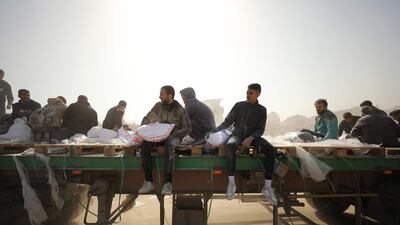Live updates: Follow the latest from Israel-Gaza
Palestinians in northern Gaza have received UN aid distributed through local tribes and police, in an effort to prevent overcrowding during deliveries. The new approach comes amid continuing warnings of famine and the first deliveries of aid by sea.
As well as laborious border checks by Israeli officials holding up overland deliveries, distribution has also been affected by desperate residents rushing aid convoys and Israeli troops shooting scores of Palestinians dead.
The process has been hindered by overcrowding at delivery points and reports of looting by the UN.
from Jabalia
However, a convoy reached northern Gaza on Saturday night, under the protection of local tribes and Palestinian policemen, who managed to secure the lorries from being overwhelmed by thousands of Gazans who have been deprived of aid.
Sources involved in the aid delivery at the Kuwait roundabout, east of Jabalia, said residents had been told not to crowd around the delivery point, where flour and food were dropped off by UNRWA, the UN agency working for Palestinian refugees, from six lorries. In a separate delivery, seven lorryloads of aid reached Gaza city.
Hassan Al Kafarna, from Jabalia, was happy to receive flour for the first time in an organised way.
"To control the arrival of aid without causing bloodshed is a respectable and commendable effort that deserves appreciation. Everyone should support this work and play a positive role in it," he told The National.
He is currently living in his partially destroyed house and is delighted that his children will finally have bread to eat.
"I asked my young son not to fast because he would only be able to break his fast with rice, but he refused and insisted on fasting all day. Now he will be happy to have suhoor and eat bread."
Yoused Ghabaeen, from Beit Lahia in northern Gaza, has been leaving his home in search of food for iftar since the beginning of Ramadan, taking great personal risk amid clashes.
"Now I feel like Ramadan has begun and my family is starting to think about what dishes to prepare for iftar," he told The National.
As his home was destroyed by Israeli bombing, he is currently living with relatives. "I hope this nightmare ends soon and I can start rebuilding my home and return to our normal life," he said.
The overland deliveries in the north come amid growing international pressure for Israel to speed up approval of aid at land borders.
Gaza needs 200-300 lorryloads of food per day to avoid shortages. On Saturday, the first shipment of aid through a maritime route, organised by Cyprus, the UAE and the EU, reached a makeshift jetty in Gaza carrying 200 tonnes of supplies.
A second ship has been loaded but its departure was delayed by bad weather on Sunday, according to the US food charity World Central Kitchen.
As the bottlenecks continue at Gaza's land borders, which would otherwise be the most efficient aid distribution channels, the US will soon be joining the aid effort, with army engineers helping to build a floating pier. Gaza currently lacks a functioning port with significant capacity for aid deliveries.


